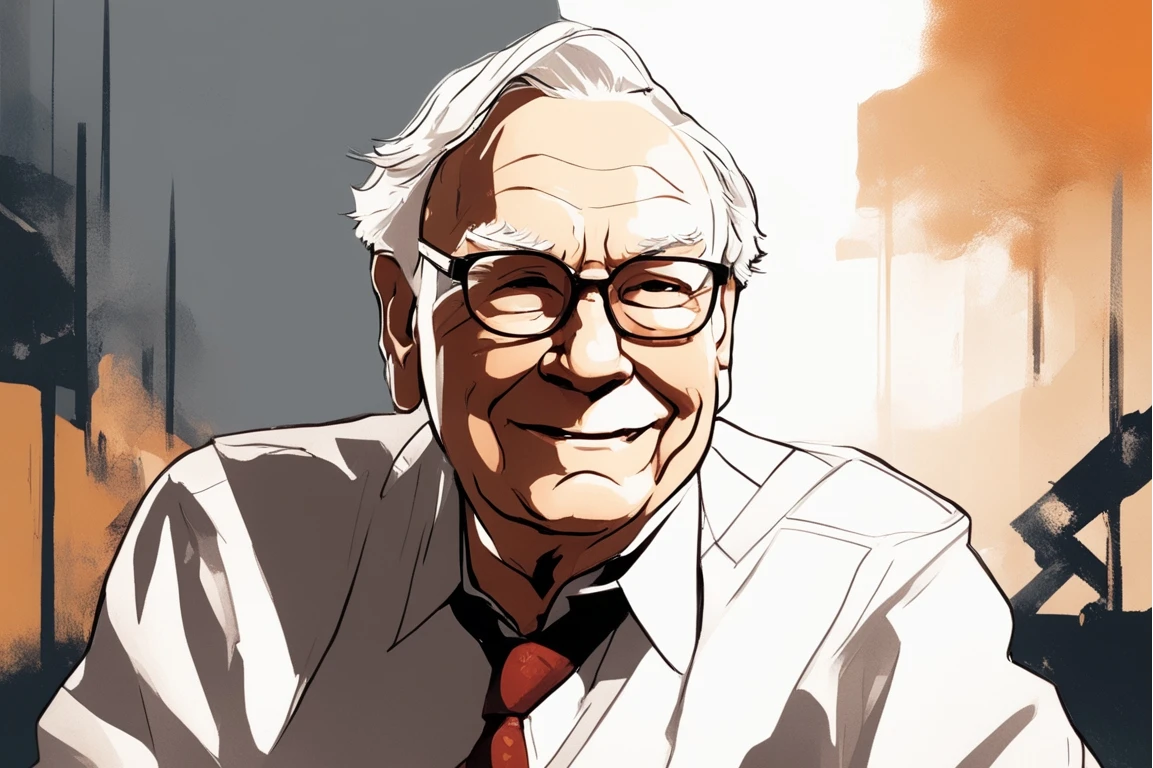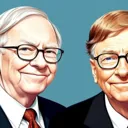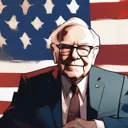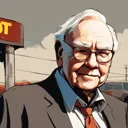Tags: Comments / Warren Buffett
This fanpage is not officially affiliated with Berkshire Hathaway: Disclaimer
Warren Buffett has very often advocated for passive investing. If you're not yet convinced and are still pouring hours and hours of research into stock market research, this article might be interesting for you.

Introduction
Warren Buffett is widely regarded as one of the most successful investors of all time. His remarkable track record, characterized by consistent outperformance and a keen eye for value, has cemented his status as a legend in the world of finance. Beyond his impressive returns, Buffett has long been an advocate for passive investing, particularly for retail investors who may not have the time, resources, or expertise to engage in active stock picking.
Buffett's early investment success, marked by an annual return of 31.6% from 1957 to 1968 compared to the Dow's 9.1% 1, provides a fascinating backdrop to the current investment landscape. His ability to consistently beat the market by a significant margin was no small feat, and it was achieved through a combination of conservative strategies, thorough analysis, and an unwavering focus on value investing.
The purpose of this article is to explore why, despite Buffett's extraordinary success, passive investing reigns supreme for most retail investors today. We will delve into Buffett's early days, the changing investment landscape, the advantages of passive investing, and the challenges of active investing for retail investors. Additionally, we will discuss the importance of investing in oneself and why comparing oneself to Buffett can be unwise.
As Buffett himself has said, "It's far better to buy a wonderful company at a fair price than a fair company at a wonderful price." This quote underscores the importance of understanding one's strengths and limitations in investing, a theme that will be explored throughout this article.
The Early Days of Warren Buffett
Warren Buffett's journey into the world of investing began at a remarkably young age. At just 11 years old, he made his first stock purchase, demonstrating an early interest and aptitude for the financial markets. This early start laid the foundation for what would become an illustrious career. Buffett even acquired farmland at the age of 15 ↗.
Buffett's partnership letters from 1957 to 1968 reveal an impressive annual return of 31.6%, far outpacing the Dow's 9.1% during the same period 1. But Buffett didn't stop there; Berkshire Hathaway’s return was more than 153 times the S&P 500's during 1965 and 2022 6. This extraordinary performance was not the result of luck but rather a testament to Buffett's conservative approach and his ability to identify undervalued securities. His strategy was built on the principle of avoiding permanent capital loss, a cornerstone of his investment philosophy.
One of Buffett's key objectives was to beat the Dow by 10% over the long term 1. This ambitious goal was pursued through meticulous research and a deep understanding of the companies he invested in. Buffett did not attempt to forecast the general market; instead, he focused on finding securities that were trading below their intrinsic value. This approach allowed him to achieve superior returns while minimizing risk.
The market conditions during Buffett's early investment years were characterized by low valuations and opportunities for significant gains. However, it was Buffett's extreme talent, dedication, and extensive reading of annual reports that gave him an informational advantage. He was known for his voracious reading habits, often spending hours poring over financial statements and company reports to uncover hidden gems.
Buffett's success was also attributed to his ability to stay within his circle of competence. He refused to invest outside his comfort zone or chase popular trends, such as the tech stocks of his time. This disciplined approach allowed him to make informed decisions based on value, facts, and reasoning.
As you can see, Warren Buffett's early days were marked by a combination of conservative investment strategies, thorough analysis, and a relentless pursuit of value. His impressive track record during this period set the stage for his long-term success and provides valuable lessons for investors today. So, how does it look like, today?
The Changing Investment Landscape
In today's investment world, high valuations and broadly available information characterize the landscape. Historically, the market has seen significant shifts in valuations. For instance, in year-end 1923, U.S. stocks were trading at less than nine times trailing 12-month reported earnings with an initial dividend yield above 6%. Similar figures can be found from the mid-70s to the mid-80s. Fast forward to early 2000, and stocks were trading at 29 times earnings with a dividend yield of just 1.2%. By year-end 2023, stocks were trading at 26 times earnings and yielding 1.5% 3. These historical comparisons illustrate the evolution and current high valuation of the market.
Technological advancements and the internet have revolutionized the availability of information. Today, investors have access to a wealth of data at their fingertips, from financial reports to real-time market news. This democratization of information has leveled the playing field to some extent but has also increased the competition. The rise of institutional investors and algorithmic trading has made the market more efficient and competitive, making it harder for retail investors to identify mispriced securities.
The Efficient Market Hypothesis (EMH) posits that security prices reflect all available information, making it challenging for investors to consistently outperform the market through stock picking or market timing 4. This hypothesis suggests that any new information is quickly and accurately reflected in stock prices, leaving little room for individual investors to gain an edge.
Retail investors face numerous challenges in this environment ↗. Identifying mispriced securities requires not only access to information but also the ability to process and act on it faster than the competition. With the market becoming increasingly efficient, the chances of finding undervalued stocks have diminished. Moreover, the influence of crowd behavior can lead to bubbles and crashes, making the market unpredictable and risky for individual investors.
It is important to outline once more: possible outperformance needs mispriced securities. At today's high valuations and with broad access to information it is very hard to see plays in the United States with extremely good risk/reward ratios. So, the investment landscape has evolved significantly, with high valuations, increased competition, and the widespread availability of information. These changes underscore the importance of adopting a suitable strategy for retail investors.
The Advantages of Passive Investing
Passive investing is a strategy that involves buying and holding a diversified portfolio of securities to match the performance of a specific index, such as the S&P 500. This approach is grounded in the belief that it is difficult, if not impossible, to consistently outperform the market through active management. Instead, passive investors aim to achieve market returns with minimal costs and effort.
Warren Buffett, a long-time advocate of passive investing, recommends investing in S&P 500 index funds for most investors. He believes that passive investors will outperform active investors in the long run due to lower costs and the difficulty of consistently picking stock market winners and losers 2. Buffett's advice is simple: "In my view, for most people, the best thing to do is to own the S&P 500 index fund." Buffett's claim is also backed by numerous studies, including Burton G. Malkiel's classic "A Random Walk Down Wall Street" (at times hard to follow, but the message is clear).
The benefits of passive investing are numerous and compelling:
- Simplicity: Passive investing is straightforward and easy to understand. Investors do not need to spend time researching individual stocks or timing the market.
- Diversification: By investing in an index fund, investors gain exposure to a broad range of companies, reducing the risk associated with individual stocks.
- Lower Costs: Passive funds typically have lower fees compared to actively managed funds. This cost advantage can significantly impact long-term returns.
- Reduced Emotional Trading: Passive investing encourages a long-term perspective, helping investors avoid the pitfalls of emotional trading and market timing.
- Consistent Performance: Historical data shows that passive investments like the S&P 500 have delivered strong, consistent returns over the long term.
The historical performance of passive investments underscores their effectiveness. For example, the S&P 500 has consistently outperformed the majority of actively managed funds over extended periods. This performance is partly due to the lower fees and the broad diversification that passive funds offer.
John Bogle, the founder of the Vanguard Group, played a pivotal role in popularizing passive investing. His advocacy for low-cost index funds has transformed the investment industry and provided millions of investors with a simple and effective way to grow their wealth. As we do not offer investment advice on this platform (see disclaimer), we encourage you to perform you own research which passive index fund would be suitable. There are many websites available 7. We have also discussed how Berkshire Hathaway, due to its massive size, number of subsidiaries and cash position has itself turned into a conglomerate with similar returns as the S&P500 during the younger past ↗. Maybe investing in Berkshire Hathway and holding it for the long term also falls into the category of passive investments? Please, make up your own mind!
But now let's look at the alternative: active investing.
The Challenges of Active Investing for Retail Investors
A lot of the questions during Berkshire Hathaway's shareholder meeting are considering equity valuations. So, shareholders are very interested in valuing equity securities and maybe finding one or the other 10-bagger as Buffett has done so many times. But this approach is a totally different approach than what we have just discussed.
Active investing can seem like an enticing path to financial success, but it comes with significant challenges, particularly for retail investors. Active investing requires a considerable amount of time and effort to be successful. This includes extensive research, continuous market analysis, and staying updated with economic trends and company-specific news. Unlike professional fund managers who have teams of analysts and access to advanced tools, retail investors often have to juggle these tasks alongside their day-to-day responsibilities.
Competing with professional fund managers and institutional investors is another major hurdle. These professionals have resources and expertise that give them a substantial edge. They can leverage sophisticated algorithms, insider networks, and vast amounts of data to inform their decisions. Retail investors, on the other hand, often lack these advantages, making it difficult to achieve comparable results.
Moreover, psychological and emotional challenges play a significant role in active investing. Market timing, for instance, requires not only skill but also a strong emotional fortitude. Behavioral biases such as fear and greed can lead to poor decision-making, causing investors to buy high and sell low. The pressure to outperform the market can exacerbate these tendencies, leading to hasty decisions and potential losses.
One of the key concepts in active investing is alpha, which refers to the ability to outperform the market. Achieving alpha consistently is incredibly challenging, especially for retail investors. Even Warren Buffett, with his legendary investment acumen, has acknowledged the difficulty of beating market indexes. In his partnership letters, Buffett noted that indexes are tough competition to beat 1.
The impact of fees and transaction costs further exacerbates the challenges for active investors. Active funds typically have higher expense ratios due to the costs associated with frequent trading and management fees. These costs can significantly erode net returns over time, making it even more difficult for retail investors to outperform passive funds.
In turn, while active investing offers the allure of high returns, it comes with substantial challenges that make it difficult especially for retail investors to succeed consistently. The time, effort, and emotional resilience required, coupled with the competitive edge of professional managers and the impact of fees, often make passive investing a more viable and rewarding strategy.
To put it bluntly: Active funds run by investment professionals generally underperform the market. Why would the retail investor with much less ressources be able to outperform then? Some will, but the majority will not. In fact, did you know that the average investor had an annualized return of 2.1% during the last decades 8?
That's 2.1% annual return for active retail investors. Feel free to let that sink in.
So, how could retail investors invest their time more effectively?
The Importance of Investing in Oneself
Warren Buffett has often emphasized that the most critical investment one can make is in oneself. He believes that investing in personal development is the foundation for long-term success. As Buffett famously stated, "Generally speaking, investing in yourself is the best thing you can do" 5.
There are several ways to invest in oneself, including acquiring knowledge, improving skills, and building networks. For instance, Buffett himself took a public speaking course with Dale Carnegie, which he credits as a pivotal moment in his life. This $100 investment not only improved his communication skills but also boosted his confidence and ability to influence others. Buffett's experience underscores the profound impact that personal development can have on one's career and personal life.
Self-improvement offers numerous benefits, such as increased career opportunities and personal fulfillment. By continuously learning and honing skills, individuals can stand out from the crowd and become indispensable in their fields. Buffett advises focusing on one's strengths and avoiding activities outside one's comfort zone. This approach allows individuals to maximize their potential and achieve greater satisfaction in their endeavors.
Buffett's advice on personal development is supported by his own words: "The best investment by far is anything that develops yourself" 5. He encourages addressing weaknesses proactively and taking steps to improve them. This mindset not only enhances one's capabilities but also fosters a growth-oriented attitude that can lead to long-term success.
The concept of human capital is central to achieving financial and personal success. Human capital refers to the skills, knowledge, and experiences that individuals accumulate over time. By investing in oneself, individuals can increase their human capital, making them more valuable in the job market and better equipped to navigate life's challenges.
Warren Buffett's wisdom on investing in oneself highlights the importance of personal development as a cornerstone of success. By acquiring knowledge, improving skills, and building networks, individuals can unlock new opportunities and achieve greater fulfillment. As Buffett's own journey demonstrates, the returns on investing in oneself can be immeasurable, leading to a more rewarding and prosperous life.
Asking Warren Buffett about his strategies often reveals a hidden message: people want to understand how they compare against the legend. But it's simply not a good idea!
Why Comparing Yourself to Buffett is Unwise
For many retail investors, Warren Buffett stands as a towering figure in the world of finance—a beacon of unparalleled success. However, attempting to replicate Buffett's extraordinary journey is not only unrealistic but also potentially detrimental to one's financial health. Here’s why; feel free to add to the following list:
1. Unique Combination of Factors
Buffett's success is a product of a unique combination of factors that are difficult, if not impossible, to replicate. He started investing at a very young age, benefiting from decades of compound interest. His innate talent for identifying undervalued companies, coupled with his relentless dedication, set him apart. Moreover, Buffett's investment environment was markedly different from today's market landscape. During his early years, the market was less efficient, providing more opportunities for a skilled investor to identify mispriced securities.
2. The Changing Market Landscape
As discussed, the investment world has evolved significantly since Buffett's early days. High valuations, the rise of technology, the availability of information, and the advent of algorithmic trading have (to a certain extend) made markets more efficient. This increased efficiency means that opportunities for significant mispricing are rarer, making it more challenging for any investor, regardless of skill, to achieve consistent outperformance. But what about the ability to realize such mispricings?
3. The Challenges of Identifying Mispriced Securities
Buffett himself has advised against trying to pick stock market winners and losers. It is a tedious task that requires enormous effort. As outlined, the majority of active managers will fail to outperform the market over the long term 2. The difficulty lies in the inherent unpredictability of the market and the vast amount of information that needs to be processed to make informed decisions. Even for seasoned investors like Warren Buffett with more than 8(!) decades of investment experience, identifying mispriced securities is a daunting task, fraught with risks and uncertainties.
4. Historical and Political Aspects
The investment world is also subject to historical and political dynamics that can drastically alter market conditions. For instance, in 1900, Argentina was predicted to become South America’s superpower, but it didn’t work out. Similarly, Ukraine was once considered a potential world power. These examples highlight the unpredictability of markets and the challenges of making long-term predictions. Buffett himself acknowledges that nobody can predict the future, which further underscores the difficulty of consistently outperforming the market. During the 2024 shareholder meeting he has underscored that Berkshire understands the United States market, which is the main reason for most of Berkshire's investments here with few exceptions ↗↗. The American tailwind has worked wonders for Buffett and Berkshire during the last decades. It is a daunting question if we would have such conditions in the next decades as well.
So, instead of trying to emulate Buffett's investment strategies, retail investors would do well to invest in themselves. This could mean acquiring new skills, furthering their education, or even pursuing hobbies that bring joy and fulfillment. By focusing on personal development, investors can improve their overall well-being and potentially increase their earning potential, which can then be funneled into a well-diversified, passive investment portfolio.
Hence, while Warren Buffett's success is undoubtedly inspiring, it is unwise for most retail investors to compare themselves to him. The unique combination of factors that contributed to his success, the changing market landscape, and the challenges of identifying mispriced securities make it more prudent for retail investors to focus on passive investing and personal development. By doing so, they can achieve consistent performance and peace of mind, allowing them to focus on other important aspects of life.

Conclusion
Warren Buffett's wisdom on investing provides valuable insights for shareholders of Berkshire Hathaway and retail investors alike ↗ ↗. While Buffett's early success and remarkable track record are impressive, the current investment landscape presents challenges that make passive investing a more prudent strategy for most individuals.
Buffett's emphasis on conservative strategies, thorough analysis, and value investing served him well in an era of low valuations and ample opportunities. However, the market has evolved, with high valuations, increased competition, and the widespread availability of information making it harder for retail investors to consistently outperform the market through active management.
The advantages of passive investing, including simplicity, diversification, lower costs, reduced emotional trading, and consistent performance, make it an attractive option for investors seeking long-term growth with minimal effort. Following Buffett's advice to invest in S&P 500 index funds can help individuals achieve their financial goals with confidence and peace of mind.
The challenges of active investing for retail investors, such as the need for time and effort, competition with professionals, psychological biases, and the impact of fees, underscore the difficulty of outperforming the market consistently. Buffett's acknowledgment of the tough competition posed by indexes highlights the importance of adopting a passive investment approach for most individuals.
Investing in oneself, as Buffett recommends, is crucial for personal and financial success. By acquiring knowledge, improving skills, and building networks, individuals can increase their human capital and unlock new opportunities. This focus on personal development, coupled with a commitment to passive investing, can lead to a more fulfilling and prosperous life.
While Warren Buffett's success is inspiring, attempting to compare oneself to him is unwise. The unique combination of factors that contributed to his success, the changing market landscape, and the challenges of active investing make passive investing a more viable and rewarding strategy for most retail investors. By following Buffett's advice, investing in oneself, and focusing on activities that align with one's strengths, individuals can achieve long-term success and financial security.
In the words of Warren Buffett 2, "By periodically investing in an index fund, for example, the know-nothing investor can actually out-perform most investment professionals. Paradoxically, when ‘dumb’ money acknowledges its limitations, it ceases to be dumb." This quote encapsulates the essence of wise investing and underscores the importance of understanding one's strengths and limitations in the pursuit of financial growth. By embracing passive investing, investing in oneself, and making prudent decisions, shareholders of Berkshire Hathaway and retail investors can navigate the complexities of the market with confidence and eventually achieve their financial goals.
References
-
Buffett Partnership Letters by Warren Buffett • Novel Investor - novelinvestor.com ↩↩↩↩
-
Warren Buffett explains why passive investing is a winning strategy - Monevator - monevator.com ↩↩↩
-
Historical Valuations - HumbleDollar - humbledollar.com ↩
-
The Mechanics of a Mispricing - www.wallstreetoasis.com ↩
-
Warren Buffett Says the Most Critical Investment Lies Within Ourselves - www.gobankingrates.com ↩↩
-
Numbers dive: Warren Buffett's performance is even more amazing than you think. - finance.yahoo.com ↩
-
Just a few examples: Head-To-Head ETF Comparison Tool on etfdb.com or Top 25 ETFs on www.marketwatch.com ↩
-
S&P 500 vs. Average Investor - www.crews.bank ↩












